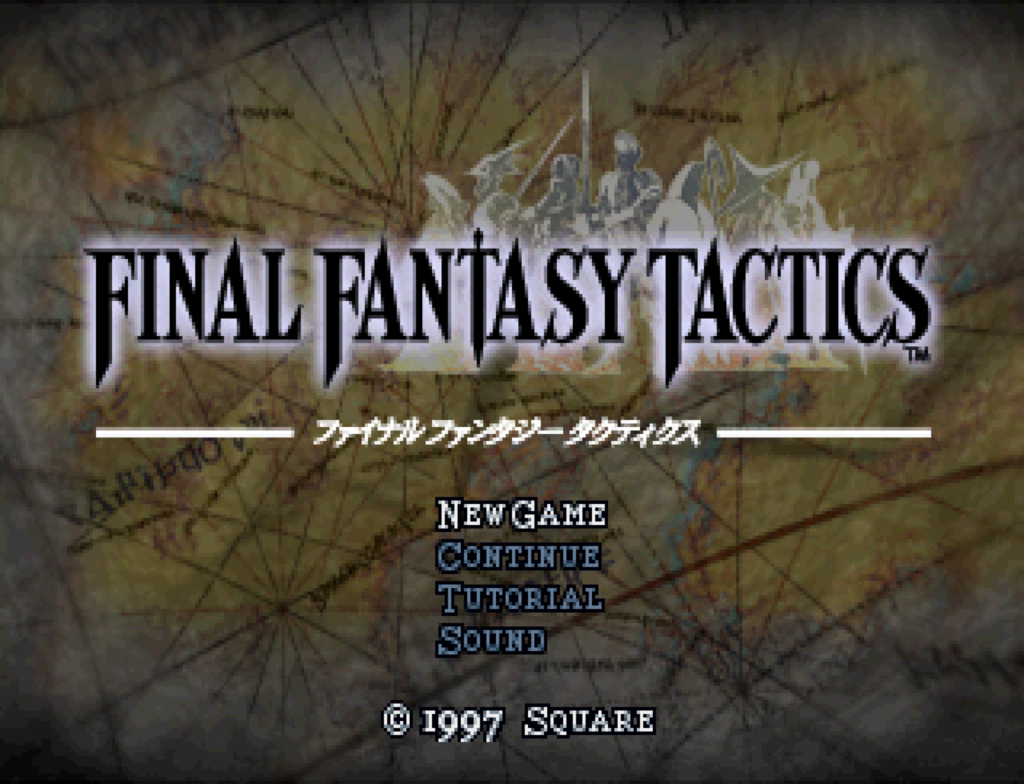
What can I say about this game that hasn’t been said already? It’s by far the most well known and popular SRPG; the Japanese wikipedia page says that it sold 1.35 million copies, the most of any SRPG in history. Many people discovered the genre through the game, some never really playing many others (“Where can I find another SRPG like FFT” is still a very common question on Internet forums). Although I had played a few stages of Shining Force 1 in high school, this was the first SRPG I completed. I stayed with a friend in college while I was doing a summer research project, and he had this game. I played it through, and the night I beat it I immediately started a new game, something I’m not sure I’ve ever done with any RPG.
The game was made by people from the Final Fantasy development as well as Yasumi Matsuno, the developer of the Ogre series. It is clearly based on Tactics Ogre, combined with a version of the job system found in FF5 and FF3.
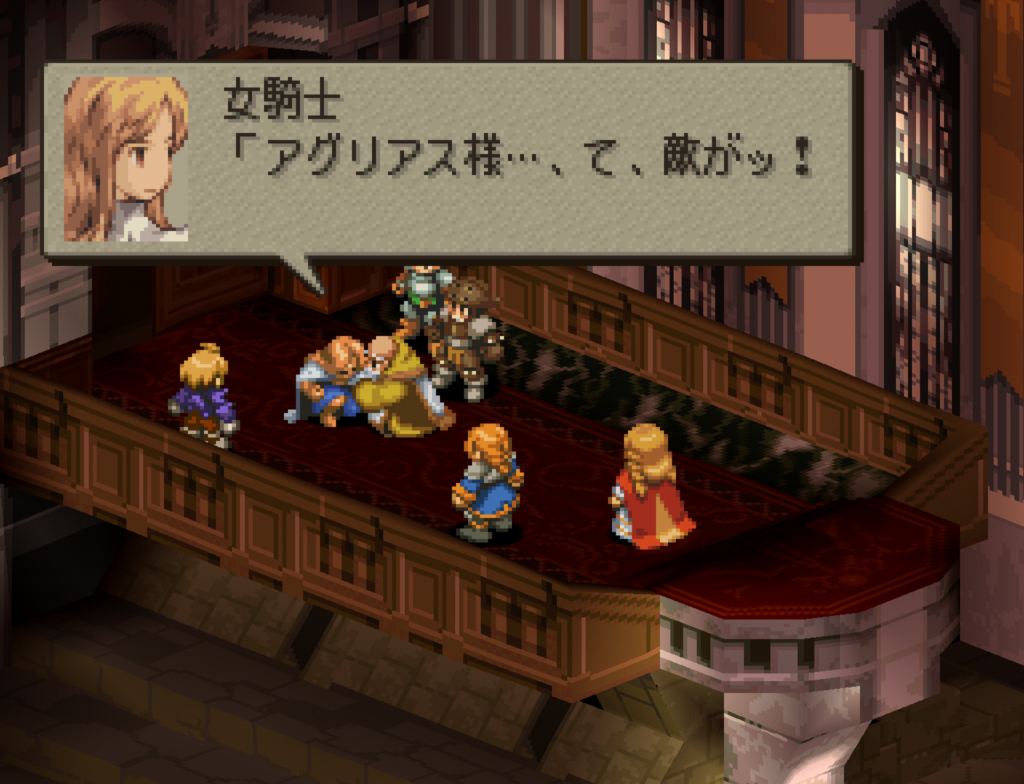
The story is often cited as one of the best in an RPG; I personally think it’s a bit overrated — the first chapter is a masterpiece of RPG storytelling, but I feel that it loses some focus in the rest of the game. It is by no means a bad story, but I preferred Tactics Ogre in that respect.
The graphics are well known for the lack of noses.
The music is another high point; it’s one of the best soundtracks in a video game and it was the first video game soundtrack I ever bought on CD.
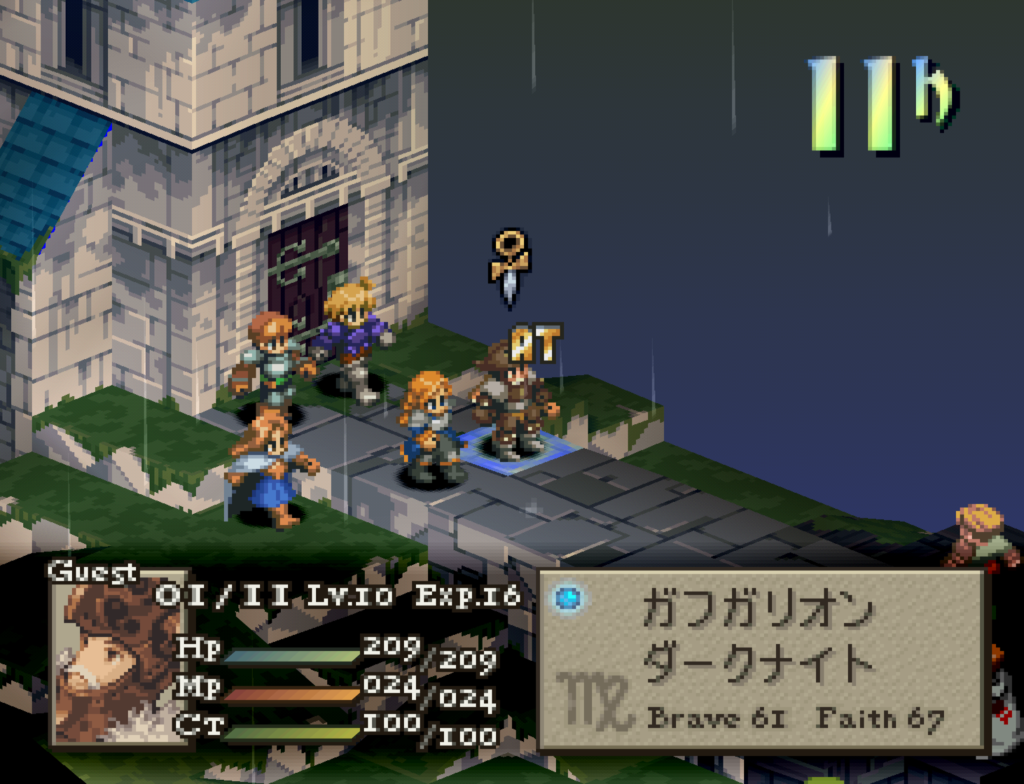
The job system allows you to select a job for a character, and then level up the job level (which unlocks new jobs) and also earn JP to spend on abilities. You can switch to a new job and then set some abilities from other jobs that you have earned.
This gives you a lot of flexibility, but it does create one of the flaws of the game, that the system is not very well balanced. Some of the jobs are nearly worthless (Archer, Knight) while others are grossly overpowered (Calculator). The system is opaque and can lead to misconceptions about how well your characters are performing — for instance, the prominently displayed “Brave” value actually affects very little in the game (mostly reaction abilities, barehand attacks, and a few special “knight” swords). However, I believe this is the first SRPG to show a detailed prediction of what will happen with a move (with attack percentage and damage).
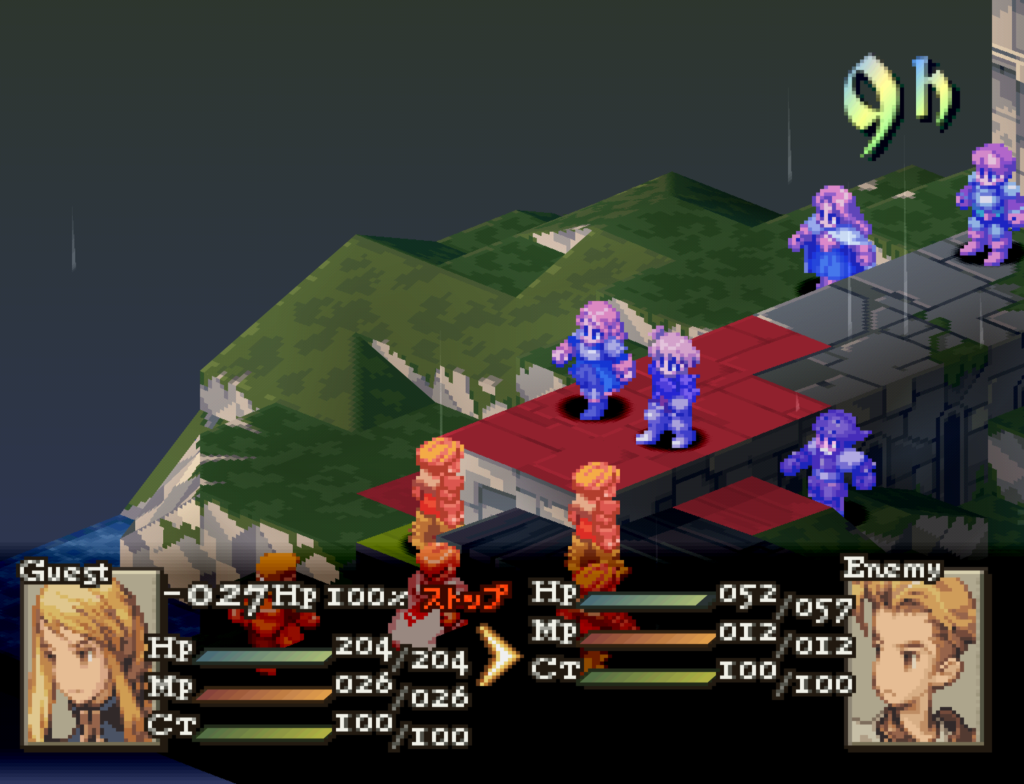
It is a bit more generous in death compared to Tactics Ogre. When someone reaches 0 hp, you have 3 turns to revive them or they will permanently die (or game over if it’s the main character).
The flexibility of the job system does allow for a lot of self-designed challenges, though. After playing it a few times, I played several “Double Dares” (where you can only use two characters, and each can only use abilities from two jobs). After that, I was on GameFAQs around the time people started getting interested in the Solo Straight Character Class challenges — where you can only use Ramza, and Ramza must stay in one class for the whole game (and not use any abilities outside of it). I was the third one to complete one of these; I beat Monk (the first two were Ramza Squire and Time Mage). My contribution is immortalized in the long GameFAQs walkthrough. At this point all of the classes have been done except for Mime and True Calculator, which are thought to be impossible. (The less difficult “Straight Character Challenge” where you can use 5 people of one class, has been completed for all characters.)
These SSCC’s weren’t the most fun, but the community around them on IRC and GameFAQs was great, and it’s one of the most enjoyable experiences I’ve had around a video game. 20 years later I’m still in touch with some of the friends I made doing those.
This game is still remembered as a classic but it is somewhat a victim of its own success; there are some people who strongly dislike it. Harvester of Eyes, who has now deleted his youtube channel and site, hated it so much that he refused to cover it on his site and considered it one of the worst SRPGs he had played (or so he claimed). I think he did have some valid points about the game — the opaque system requires a lot of grinding if you don’t understand it, there are a few cheap battles (particularly the solo vs. Wiegraf), and it’s not quite as tactical as other games. But for me it’s still a one of my favorites.
It was re-released for the PSP in an updated version, which I don’t know much about, but I’ll cover it when I reach there.
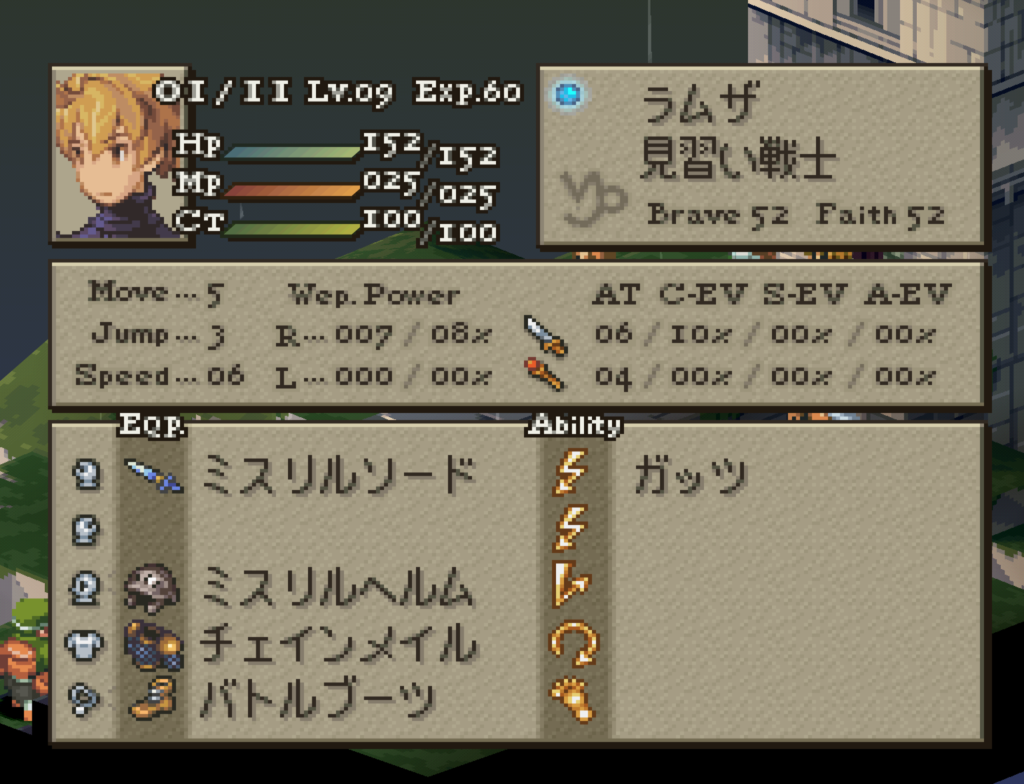
I’m close to finished with Seiken Densetsu 3 so things should return to normal next week.
If you mean a battle forecast, technically FE3 & 4 had one before this, though it is a bit cumbersome and you have to do the damage calculation yourself. Didn’t Tactics Ogre have one as well?
I already mentioned my grievances with FFT on the TO page so I won’t repeat them here.
I got the green label Greatest Hits version after seeing it played at a friend’s house. I was quite obsessed with it for a while, but oddly never got to the end (fickleness of a child I suppose) – I finally got around to it a few years ago. Really enjoyable, but it is sort of funny how easily you can break the game over your knee, with just a *little* knowledge, past a certain point.
If I remember correctly, thanks to emulation, Super Robot Wars 3 was my first SRPG. This couldn’t have been too long after that. I suppose what’s funny to me about that is how players of certain SRPG games think the entire genre MUST work like that one game – so I’ve seen some of those fans asking around for games like FFT get mad when they find another SRPG and it isn’t exactly like FFT. I’ve always found that excessive, but I wonder if my finding SRW so early adjusted my expectations.
I agree about the story starting really strong and then kinda wandering around too much further in. I did like the ending, though.
I still read this blog btw, because you do good work, but I’m mostly content to lurk and read. Just posting this here since you did mention me in the article. And because you’re one of the few FFT fans who’s a level-headed, decent, and fair person.
You’re right: I still consider FFT among the worst SRPGs I’ve played, although it’s definitely better than Banner Saga, AKA Walking Simulator Saga. I can understand the appeal of different challenge runs and the customization that this lends itself to; however, there are better SRPGs to do challenge runs of. FFT was way too grindy, it had very abrupt difficulty curves, its max party size is 4, its mobility is way too limited, its classes are not balanced, its classes are not even that in depth, and class skills aren’t even listed (which lends itself to trial-and-error gameplay unless you’re using a guide).
Indeed, most of the game relies heavily upon “metagaming” knowledge just like Ogre Battle did. If you go into the game and already know what to expect, it’s excessively easy. Almost trivially so. But on a first time playthrough without consulting a guide, the game is unforgivingly obtuse and requires hours upon hours of grinding and trial and error. That is not good game design, particularly for a STRATEGY game; grind is completely antithetical to strategy. There are also other problems like weird glitches and abundant camera issues (which weren’t even present in Tactics Ogre) that hold the game back.
Even as a traditional RPG, its 1997 PS1 version is riddled with so many translation errors and malapropisms, that it makes Little Carmine Lupertazzi (from the Sopranos) look like Shakespeare. “Very allegorical – the sacred and the propane!” For this reason, I found it very difficult to enjoy the story, although in fairness, the PSP’s version rectifies this. But it does nothing to improve the abysmal gameplay, so what’s the point? One other thing that I’d hold against FFT is its negative influence on the genre as a whole. Because of FFT, you have a boatload of garbage-tier SRPGs like Fell Seal, Mercenaries Saga, and God Wars. The only remotely decent FFT-influenced SRPG I’ve played is Magic Scroll Tactics.
All things considered however, the thing that completely ruins FFT for me is its insufferable fanbase. They’re a large part of the reason I decided to stop content creation entirely. It’s just not worth it when your favorite genre of games is absolutely infested with irascible, belligerent malcontents (who only want uncreative FFT knockoffs, instead of all the other 100s of games the genre has to offer). And that’s the FFT fanbase in a nutshell: closeminded bullies. I’ll never understand the mindset; I love Langrisser 2, but if someone says it has problems, so what? I don’t feel any compulsive need to insult and demean them. Yet if you say anything REMOTELY bad about FFT, you’ll find yourself beleaguered by rabid throes of brainwashed Matsuno fanboys whose new life goal is to make your life a living hell.
Fuck that shit and fuck FFT.
Thanks for the response and glad to you know are still reading — I hope you didn’t take my comment as a callout against you; I meant it more as a “people who know what they’re talking about dislike the game”. You’re not the only SRPG fan I’ve seen who is anti-FFT, and as I said in the post I think all your criticisms of the game are valid. I wonder if I would like it as much if it hadn’t been the first SRPG I played to completion.
Oh yeah, I definitely did not interpret that as a callout or anything. You’re about the last person I’d expect to be starting frivolous drama, which is one thing that sets you apart from many FFT/Matsuno fans. I also appreciate how you have an obvious respect/love for the SRPG genre. That is also something I almost never see among typical FFT fans, who ignore 99.9% of SRPGs and complain that “there are no good SRPGs out there, woe is me!” (Seriously – it feels like the LESS someone has played Matsuno’s games, the MORE receptive they are to SRPGs/strategy games more broadly.)
You do a good job with the “chronogaming” angle, so it’s neat to see the history of the genre and how it evolved. There are quite a few gems that your blog has helped me find, which I otherwise would have never discovered: Energy Breaker and Vixen 357 for example. So of course I will gladly still follow this blog. I will say that it is a tad disappointing to not hear your perspective of more recent games, but I understand that’d go against the “chronogaming” theme. Maybe by the time 2030 rolls around, you’ll be covering games from the 2010s-2020s.
There are so many great SRPGs/TBSes out there and it makes me sad that so many people overlook almost all of them. But anyway, I’ll go back to lurking and playing Mario + Rabbids in the meantime. Kind of weird how a RABBIDS game, of all things, ended up being a better strategy game than any of the modern Fire Emblem titles (seriously wtf “Intelligent” Systems?), but I sure ain’t complaining.
I may look into playing newer games when I finish the Super Famicom list. At that point I’m hoping to alternate the chronological SRPGs with randomly selected games, reader selected games, more modern games, and such. At my current pace it will probably take another 3 years give or take a year.